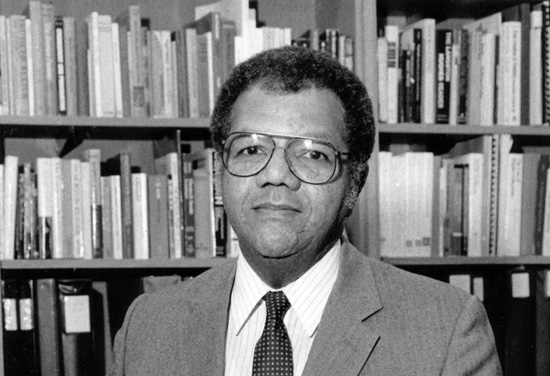Higher Education Innovator, Leader Dies at 72
 |
| Edgar F. Beckham was Wesleyan’s first African-American dean of the college. In 1991 he received Wesleyan’s Raymond E. Baldwin Medal for service. |
| Posted 05/25/06 |
| Edgar F. Beckham, one of the nation’s most influential and beloved leaders in higher education, died Wednesday in Middletown at the age of 72. He was a resident of North Haven.
As the first African-American dean of the college at Wesleyan University, Beckham led efforts to build understanding that diversity is integral to excellence in American education. While he served as dean, Wesleyan University became a national model for excellence in education for students of diverse backgrounds. Beckham also served as the chair of the Connecticut Board of Education, working to bring the lessons learned at Wesleyan to the public schools of Connecticut. In the 1990s, he headed one of the most far-reaching and effective change efforts ever launched in higher education: the Ford Foundation’s Campus Diversity Initiative. Then in 1998, he joined the Association of American Colleges and Universities (AAC&U) as a senior fellow, where he continued to guide colleges and universities throughout the United States on matters of educational quality. Beckham’s civic contributions were many. In addition to his service to Connecticut education, he served as chair of the boards of Middlesex Hospital, the Donna Wood Foundation, and the Connecticut Humanities Council. He also served as a trustee to the Connecticut Housing Authority, Mount Holyoke College, Vermont Academy, Connecticut Public Broadcasting and the Association of International Educators. Beckham was honored with numerous awards. In 1997 he received the Outstanding Contribution to Higher Education Award from the National Association of Student Personnel Administrators. In 1991 he received Wesleyan’s Raymond E. Baldwin Medal, awarded for extraordinary service to Wesleyan and to the public good. In 1996, he was named Dean of the College Emeritus, and in 1998 the Wesleyan Alumni Association honored him with its Distinguished Service Award. Beckham received the honorary degree of Doctor of Humane Letters in 1997 from Olivet College and in 2000 from Clark University. “Edgar Beckham’s legacy is his message that diversity is about much more than adding people of color to white campuses,” said AAC&U president Carol Geary Schneider. “He led a movement to enlarge the content of the curriculum, create intercultural community on campus, add new dimensions to liberal education, and build new civic capacity for democracy. He enriched us all with his life, his work, and his love.” Edgar Beckham was born August 5, 1933 in Hartford, Conn., the son of Willabelle Hollinshed and Walter Henry Beckham. He grew up in a diverse neighborhood in Hartford and attended Weaver High School. In 1951, Beckham enrolled at Wesleyan University, the recipient of the Lewis Fox Scholarship for his outstanding academic record at Weaver High School, and of several other named scholarships. He pursued a pre-med course of study, and was editor-in-chief of the Argus, Wesleyan’s student newspaper, a member of the choir, and a fraternity member of Delta Sigma. Between his junior and senior years at Wesleyan, he served for three years in the U.S. Army in Germany where he trained as a neuropsychiatric technician. He graduated from Wesleyan University in 1958 with a bachelor’s degree in German. That same year, he married Ria Haertl of Stuttgart, Germany. He earned his master’s and completed his doctoral course work in Germanic languages and literatures at Yale University. He began his academic career at Wesleyan in 1961 as an instructor of German. He spent 28 of the next 29 years at Wesleyan, serving in various posts including lecturer in German, director of the language laboratory, associate provost, and, from 1973-1990, dean of the college. “Edgar Beckham guided Wesleyan through the very difficult and utterly transformational period when we learned the hardest lessons about what it meant to be a diverse community,” said Wesleyan President Doug Bennet. “He succeeded by keeping us focused on what we could accomplish for ourselves and the larger society as we succeeded.” Beckham also taught Freshman Humanities and courses in African-American studies at Wesleyan. While at Wesleyan, Beckham was the coordinator of Explorations in the Black Experience, an experimental high school course in black history designed and taught by Wesleyan undergraduates. He was also coordinator of studies for Wesleyan Upward Bound, an anti-poverty program for high school students. Beckham spent the 1966-1967 academic year abroad in Germany where he taught English language and African-American history and literature at the University of Erlangen-Nuremberg. He also lectured extensively at America Houses throughout the Federal Republic of Germany on the state of civil rights and racial consciousness in the United States. In the fall of 1990, Beckham accepted a position as program officer for the Ford Foundation’s Education and Culture Program. In this capacity, he affected the curriculum and co-curricular activities at hundreds of American college campuses. He organized international seminars on campus diversity in India, South Africa, and the United States, and he wrote and edited materials for the three volumes of essays based on the seminars. Beckham’s singular contributions to the Foundation’s work on access, diversity as an educational asset, and multicultural education earned him the unprecedented title of Senior Program Officer. “Edgar was the philosopher-king and the moral conscience of the Education and Culture Program,” said Alison R. Bernstein, a current vice president of the Foundation who worked closely with him. Beckham is survived by his wife, Ria; son Frederick and daughter-in-law Julie; a sister, Ruth Beckham Holloman; a brother, William Beckham; a niece, Merle Holloman; and a nephew, Wendell Holloman. A service was held May 30 at Wesleyan University’s Memorial Chapel. |

